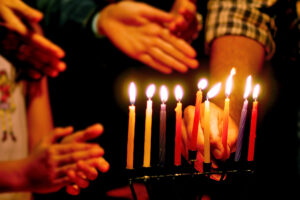HOW TO PRACTICE HITBODEDUT
When and where to practice hitbodedut, how often, how long and about what, simply and openly and like a child…
Private conversation with God can be enjoyable or awkward. It depends entirely on you. Keep hitbodedut simple and you’ll feel such an affinity for it that you’ll eagerly await its moments every day. Often, people will read about conversing and meditating with God, they’ll study all the pertinent lessons and teachings on hitbodedut and become familiar with all it’s details: when and where to practice it, how often, how long and about what.
But when it comes to actually going out, or in, and doing it – stage-fright! systems crash! Your mind goes blank, your words dry up. What to do? Don’t worry, it’s not at all uncommon for this to happen, and not only to beginners. The Rebbe once said that when a person is meditating and all he can say is “Master of the World!” this is also very good (Tzaddik #440). He also said that just sitting, without being able to say anything, is also valuable (Likutey Moharan II, 25); and sometimes, no matter how much we know about hitbodedut beforehand, this is all we can do.
The Rebbe once said that when a person is meditating and all he can say is “Master of the World!” this is also very good!
Simply and openly. Rebbe Nachman said to Reb Noson: A person should practice hitbodedut in a simple, straightforward manner, as if he were conversing with a close friend (Tzaddik #439; Kokhavey Or p 12 #4). Have you ever had a problem which you spoke about to a friend, a true friend? You start saying something, this leads to something else, and before you know it you’re revealing the innermost secrets of your heart. The words just seem to flow. this is because you’re close to that friend, and you see no reason to hold back. Hitbodedut should be the same way:
“Yankel, you know what happened to me today? I woke up feeling good and went to shul. I started praying energetically. But then I saw Avi, with whom I had an argument last week. Next thing I knew, I lost my enthusiasm and felt like dead wood. You know, it’s becoming more and more like this every day. Anyway I went home in a sour mood and ended up fighting with my wife. From there I went to work and had a miserable day. In fact, I wouldn’t be surprised if my boss fires me. What am I going to do? I can’t seem to get hold of myself. I try to keep things under control and make it through the day on the right foot but it always turns out wrong. What can I do? Maybe you have some ideas?”

A person should practice hitbodedut in a simple, straightforward manner, as if he were conversing with a close friend!
Now, instead of addressing your close friend, address your “closest” Friend. Just substitute God for Yankel. You can express and unburden yourself in exactly the same way, with the same frankness and detail. After all, if Yankel can listen and maybe offer help. certainly God can! [It is important to point out that which our Sages state: “There can be no friendly manner towards Heaven” (Bava Batra 16a). One may not actually think or talk to God with a familiarity, as if He were a pal. However, this is not meant to exclude direct and personal prayer – hitbodedut – in which one addresses the Almighty as one talks to a good friend. The openness and candor with which we “reveal all” to a close friend, and which is desirable when conversing with God, should not be misunderstood as a license for a friendly manner when addressing Him (see also Gittin 57a)].
Like a child. Rebbe Nachman also drew another analogy concerning hitbodedut. In his desire to make it crystal clear how we are to approach this most important practice, he said that it is very good to pour out our thoughts before God, like a child pleading before his father. God calls us His children, as is written (Deuteronomy 14:1), “You are children to God.” Therefore, it is good to express your thoughts and troubles to God like a child complaining and pestering his father (Rebbe Nachman’s Wisdom #7).
(Taken from the book Crossing the Narrow Bridge: A Practical Guide to Rebbe Nachman’s Teachings – chapter 9 – Hitbodedut)
- 0 comment






















